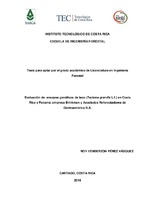Mostrar el registro sencillo del ítem
Evaluación de ensayos genéticos de teca (Tectona grandis L.f.) en Costa Rica y Panamá, empresa Brinkman y Asociados Reforestadores de Centroamérica S.A.
| dc.contributor.advisor | Murillo-Gamboa, Olman | |
| dc.contributor.author | Pérez-Vásquez, Roy Yenderzon | |
| dc.date.accessioned | 2017-05-03T17:39:19Z | |
| dc.date.available | 2017-05-03T17:39:19Z | |
| dc.date.issued | 2016 | |
| dc.identifier.uri | https://hdl.handle.net/2238/7041 | |
| dc.description | Proyecto de Graduación (Licenciatura en Ingeniería Forestal) Instituto Tecnológico de Costa Rica. Escuela de Ingeniería Forestal, 2016. | es |
| dc.description.abstract | A worldwide level, teak (Tectona grandis) wood is one of the most appreciated and commercialized occupying 74% of the area planted with hard tropical species of high value; in Costa Rica, 20% of the total harvested wood corresponds to teak from plantations destined for export. Hence the importance of improving the commercial performance of plants based on genetic improvement. The evaluation of genetic testing corresponds to an effective evaluation methodology under which it is possible to genetically improve the material planted commercially. In this study, three genetic tests were evaluated (one located in Darién, Panama and two in the south pacific on Costa Rica). The first chapter corresponds to an analysis of the behavior of genetic parameters and the genetic relationships between different variables evaluated at eight ages in a test with 25 genotypes and 2 controls, which correspond to seed. From the above, it was observed that for both the variable diameter at breast height (DBH) and the commercial volume, the estimated parameters of the individual heritability and clone means reach the maximum, and in turn stabilize between the 4.7 years and 5.8 years; therefore, for the conditions under which, for a reasonable price, for a generic selection of Tectona grandis. All 10 best genotypes with the two controls, an age of 4.7 years, it was determined that in the DBH the 10 best clones recorded an increase of 25.8% with respect to the controls and in commercial volume by the tree gain amounted to 68.6%; In addition, based on the information obtained by the DAP, it was determined that for a rotation shift of 18 years with commercial seed, the 10 genotypes were established, the final harvest was done 4.6 years before the controls were executed. The second corresponds to an evaluation of two clonal tests in different environments (one in Darien, Panama and one in the south pacific on Costa Rica) with the objective of determining the genotype-environment interaction of the clones evaluated. From the above, it was found that in the case of Panama test at 5.9 years of age in commercial volume per tree there is no significant difference between accessions; In addition, at this age, the 10 best genotypes showed a genetic gain of 4.6% in diameter at breast height (DBH) and 9.3% in commercial volume per person relative to seed use; Based on diametric information, a gain in time for the final harvest of 0.8 years was estimated to establish the 10 best genotypes with respect to seed, previous, based on rotation shifts of v 18 years. In the Costa Rican trial, from the age of 3.0 the heritabilities (both clone medium and individual) are stabilized, indicating the possibility of early genotypic selection; On the other hand, the 5.4 years are recorded in commercial volume per individual, the highly significant differences between accesses. The genetic gain shown by the 10 best clones, all with the controls, was 33.0% in DAP and 88.7% in commercial volume per individual, the gain in time for harvest was 5.9 years with respect to controls. The genotype-environment interaction indicated the presence of stable clones in different environments with high volumetric yield, these correspond to clones 24, 22, 26, 27, 29 and 18, and genotypes with low yield were identified in both sites. Clones 8, 19 and to a greater extent were 7. In addition, genotypes with a strong genotype-environment interaction were found, which maintained very contrasting volumetric yields in both trials evaluated. | en |
| dc.language.iso | spa | es |
| dc.publisher | Instituto Tecnológico de Costa Rica | es |
| dc.rights | acceso abierto | es |
| dc.subject | Teca | es |
| dc.subject | Ensayo clonal | es |
| dc.subject | Mejoramiento genético | es |
| dc.subject | Silvicultura clonal | es |
| dc.subject | Rotación | es |
| dc.subject | Research Subject Categories::NATURAL SCIENCES::Biology::Cell and molecular biology::Genetics | en |
| dc.subject | Research Subject Categories::FORESTRY, AGRICULTURAL SCIENCES and LANDSCAPE PLANNING::Plant production::Forestry | en |
| dc.title | Evaluación de ensayos genéticos de teca (Tectona grandis L.f.) en Costa Rica y Panamá, empresa Brinkman y Asociados Reforestadores de Centroamérica S.A. | en |
| dc.type | proyecto fin de carrera | es |


